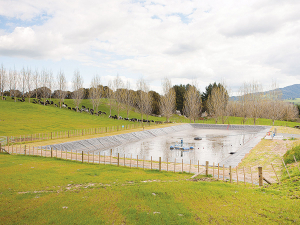Waikato dairy effluent breaches lead to $108,000 in fines
Two farmers and two farming companies were recently convicted and fined a total of $108,000 for environmental offending.
 Odour issues can also be a regional council compliance concern if offensive or objectionable odours are detected beyond the property boundary.
Odour issues can also be a regional council compliance concern if offensive or objectionable odours are detected beyond the property boundary.
Odour from farm dairy effluent is increasingly an issue as herd sizes grow and urban boundaries get closer to operating farms.
Odour issues can also be a regional council compliance concern if offensive or objectionable odours are detected beyond the property boundary.
Management of odour is often referred to in effluent consents.
Odour is generated during the incomplete anaerobic (low/ no oxygen) breakdown of organic matter in effluent. Sources of odour include ponds, tanks, solids separation systems, sludge piles, feed pads, and silage stacks.
Effluent application, the de-sludging of ponds and muck spreading operations also release odour.
For this reason, it is sensible not to construct ponds, yards, pads, stock housing or other odour generating facilities near property boundaries. Many district and regional councils will have minimum distance requirements, however you should also note the direction of the prevailing wind and what will be ‘downwind’ of your pond or facility.
If a neighbour complains to the regional council about an odour the council will come out to your farm and assess the situation for frequency, intensity, duration, offensiveness and location of the odour. Infringement /abatement notices may be a potential consequence.
Keeping the neighbours happy
If you are planning an activity you know will generate some odour, such as spreading a large solids pile or desludging a storage pond, consider these handy tips:
If a neighbour complains about an objectionable odour or you notice some issues yourself you must investigate further.
This is not generally a problem that disappears quickly.
What is the problem? Often the main culprit is the effluent storage pond although it does pay to check that there’s not a problem with effluent stored in the mainlines. This can happen if it’s been a significant time since you last irrigated.
Cause of Smell
Odours from ponds are caused by a mixture of gases. The type of pond and the way the pond is operated and maintained impacts on odour production.
These gaseous compounds are produced all the time but usually at low levels that are not an issue. However, occasionally they get out of balance and produce an ‘odorous’ episode.
The main gas that is likely to cause many issues for dairy effluent ponds is hydrogen sulphide with ammonia gas more of an issue with large volumes of effluent solids. Hydrogen sulphide comes from the anaerobic (no oxygen) layer of ponds produced by bacteria that reside there. In a healthy pond, hydrogen sulphide moves from the anaerobic layer to the aerobic layer and is changed by a different bacteria into sulphur oxide gases (not quite as smelly), which are then released to the atmosphere. This process can go wrong, resulting in the release of odorous hydrogen sulphide to the atmosphere.
Registrations are now open for the 2026 Ruralco Golf Classic, with all proceeds from the event set to support the Mid Canterbury Rural Support Trust.
Mating wrapped up last month at the across-breed Beef Progeny Test on Pāmu’s Kepler Farm in Manapouri.
Libby Judson is a keeper of memories from an age gone by. Tim Fulton tells her story.
A New Zealand-first native tree study has highlighted the Bioeconomy Science Institute's position as a forestry research leader.
Hemp fibre processor Rubisco is relocating its core processing facility to Ashburton as part of a $20-$30 million expansion to leverage what it says is an accelerating global demand for sustainable and renewable fibres.
Tradition meets some of the latest in technology at the 2026 East Coast Farming Expo.
President Donald Trump’s decision to impose tariffs on imports into the US is doing good things for global trade, according…
Seen a giant cheese roll rolling along Southland’s roads?